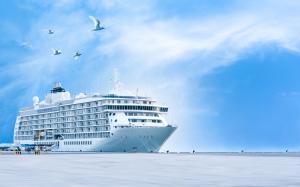Legal Considerations for Cruise Ship Injuries: What Louisiana Travelers Should Know
Most passengers don’t realize that the cruise ticket itself functions as a legal contract. That contract often contains language that restricts where and when a lawsuit can be filed. ”
OPELOUSAS, LA, UNITED STATES, July 2, 2025 /EINPresswire.com/ -- Cruise vacations are marketed as stress-free getaways, but injuries on board can quickly turn a relaxing trip into a legal and medical ordeal. Passengers who suffer harm while at sea often face a complex web of maritime laws that differ significantly from land-based personal injury claims. Understanding these legal distinctions is critical—particularly for Louisiana residents embarking from Gulf Coast ports.— William P. Morrow
Morrow Law Firm in Opelousas, Louisiana, led by attorneys William P. Morrow, John Michael Morrow, Jr., and Stephen M. Morrow, handles a wide range of personal injury cases, including those involving offshore and maritime environments. William P. Morrow, who focuses on injury claims stemming from workplace and offshore incidents, notes that cruise ship injury claims can present unique legal hurdles that travelers rarely anticipate.
“Most passengers don’t realize that the cruise ticket itself functions as a legal contract,” said William P. Morrow. “That contract often contains language that restricts where and when a lawsuit can be filed. In many cases, it requires that legal action be brought in a specific federal court, and the timeline to file may be far shorter than standard Louisiana law allows.”
Cruise lines frequently include clauses that designate a particular jurisdiction—often in Florida or another state far from where the passenger resides. This can complicate matters for injured individuals trying to recover damages. Some contracts even require arbitration or mediation, which limits the ability to pursue claims through a traditional court process.
According to the Centers for Disease Control and Prevention, hundreds of injuries are reported on cruise ships each year, ranging from slips and falls to more severe incidents such as onboard fires or medical negligence. While some injuries are minor, others can lead to long-term disability or significant medical costs.
One of the key challenges in cruise injury litigation involves determining liability. Cruise lines may argue that they are not responsible for certain conditions that caused harm, especially if those conditions were the result of independent contractors or third-party excursion providers. In many cases, injury claims involve careful scrutiny of maintenance records, staff training protocols, and surveillance footage.
“It is not uncommon for passengers to assume that the cruise line is automatically liable for everything that happens onboard,” Morrow explained. “But maritime law sets a different standard. The burden is on the injured party to prove that the cruise line failed to act with reasonable care under the circumstances.”
Maritime law, also known as admiralty law, governs activities that take place on navigable waters. It is a distinct body of law with roots in international and federal statutes, and it often supersedes state law in cases involving ships and seagoing vessels. For injured passengers, this means that familiar Louisiana legal protections may not apply in the same way once the ship leaves port.
Additionally, injury claims involving crew members fall under a different legal framework altogether. The Jones Act, a federal statute designed to protect seamen, provides specific rights to compensation for workers who are injured in the course of their employment. However, this protection generally does not extend to cruise passengers.
Despite the complexities, timely action remains one of the most critical components of any injury case. Cruise contracts often contain strict notice and filing deadlines—some as short as six months to provide written notice of the incident, and one year to file a lawsuit. Missing these deadlines can result in forfeiture of the right to recover damages.
Another layer of complexity arises when foreign ports or international waters are involved. Jurisdictional issues may influence not only where a case is filed, but also which laws apply. Courts must sometimes evaluate questions involving choice-of-law provisions, international treaties, and maritime conventions.
“Even a seemingly straightforward case, like a slip on a wet deck, can involve multiple layers of legal analysis,” Morrow added. “It often requires examining cruise line policies, international maritime standards, and federal case law.”
For Louisiana residents planning a cruise, it is worth reviewing the fine print on the ticket and understanding the legal obligations it may impose. In the event of an injury, documenting the circumstances immediately—through photos, witness names, and incident reports—can prove critical if legal action becomes necessary.
Morrow Law Firm continues to monitor developments in maritime litigation and advises that injured individuals seek legal counsel promptly after returning home. While cruise lines often maintain a strong legal defense, injured passengers may still have viable claims under the right circumstances.
The firm is based in Opelousas and is led by William P. Morrow, John Michael Morrow, Jr., and Stephen M. Morrow. Together, they bring decades of experience handling injury claims throughout Louisiana and are familiar with the nuanced intersections of state, federal, and maritime law.
For more information about legal rights following an injury on a cruise ship, refer to official maritime regulations and consult with qualified legal professionals familiar with admiralty law and venue-specific contract language.
Morgan Thomas
Rhino Digital, LLC
+1 504-875-5036
email us here
Visit us on social media:
Facebook
Legal Disclaimer:
EIN Presswire provides this news content "as is" without warranty of any kind. We do not accept any responsibility or liability for the accuracy, content, images, videos, licenses, completeness, legality, or reliability of the information contained in this article. If you have any complaints or copyright issues related to this article, kindly contact the author above.


